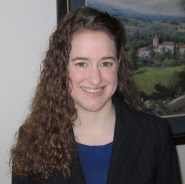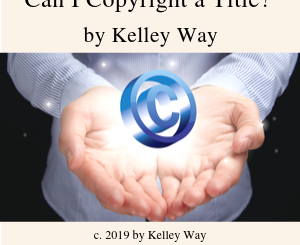Using Real People in Stories, Part 2 of 3, By A Copyright Law Attorney
 Welcome to our regular column on literary law. Today we focus on the thorny issue of using real people in our stories, part 2 of 3 — from our monthly guest columnist, Kelley Way, a lawyer specializing in literary law. If you have general questions for Kelley on contracts or other aspects of literary law, be sure to comment below. Thanks!
Welcome to our regular column on literary law. Today we focus on the thorny issue of using real people in our stories, part 2 of 3 — from our monthly guest columnist, Kelley Way, a lawyer specializing in literary law. If you have general questions for Kelley on contracts or other aspects of literary law, be sure to comment below. Thanks!
PS. A list of books on literary law can be found here.
PPS. For more on copyright, visit the U.S. Copyright Office.
And now for a bit of necessary legalese: Please note that this article does not constitute legal advice, and that an attorney-client relationship is not formed by reading the article or by commenting thereon.
***
In my last article, we talked about defamation and how to avoid a defamation suit. While it’s
important to know, it’s not likely to come up unless you actually lied and used the person’s
name. In most cases, the average citizen will sue on the basis of violation of the right of privacy.
There are four different claims that fall under the right of privacy:
1.) Appropriation/Misappropriation (the courts can’t make up their minds which one to call
it)
Appropriation is the use of a person’s name or image for a commercial purpose. Let’s go
back to your old neighbor John. John is a very handsome guy, and you need a handsome man
for the cover of your romance novel. So you lie in wait, camera in hand, and take a bunch
of pictures of him on the sly. You use one of these pictures on your cover and publish your
book. John would have the grounds to sue you, because you are using his face to sell books.
Of course, this could all be avoided if you just asked him nicely and got his permission. In
writing.
2.) Intrusion
This is the claim that most people think of when the right of privacy comes up. This covers
wiretapping, hacking, surveillance, taking photos of people in their homes or yards, and all
those other fun spying activities we like to read about. If one of the above activities is a pet
hobby of yours, I would recommend you keep it under wraps, and not place evidence of it in
your memoir or novel. Though if the person being spied on is ok with it, then that’s just fine
and dandy.
3.) False light
False light involves spreading a major falsehood about a person, which the average person
would object to. This is similar to defamation, since it’s about telling lies, but false light is
broader, because the lie doesn’t have to harm the person’s reputation. For example, printing
in your memoir that John had a meth lab at the back of his house is defamation. Printing that
John was a closet Satanist is not defamation, since religious beliefs are not considered part of
one’s reputation, but it is false light, since the average person would probably object to being
called a Satanist. Whether you honestly believed it or not doesn’t matter, but like defamation,
you can avoid this by making sure that you’re saying is true. And, like the other privacy
claims, if John agrees (in writing!) to let you print the false statement, then you’re free and
clear.
4.) Disclosure
As the name implies, disclosure is the spreading of confidential information which the average person would object to. This is different from the other claims because here, you are spreading true information: what matters is that it is intimate, and was not meant to be passed on. For example, if your memoir talks about your conversation with John, where he told you about his secret affair, you could very well be seeing John in court. The principle here is simple: don’t put other people’s secrets and private affairs (no pun intended) into print. At least, not until John signs a permission slip.
That’s the nuts and bolts of the right of privacy. If you need clarification or more information, please leave a comment or send me an email. Feedback is always welcome!
Stay tuned for the third and final installment of this series, covering the right of publicity.
***
ABOUT THE AUTHOR
 Kelley Way was born and raised in Walnut Creek, California. She graduated from UC Davis with a B.A. in English, followed by a Juris Doctorate. Kelley is a member of the California Bar, and an aspiring writer of young adult fantasy novels. She can be contacted at KelleyAWay@gmail.com. You can contact via your comments below or email her directly to set up a consultation.
Kelley Way was born and raised in Walnut Creek, California. She graduated from UC Davis with a B.A. in English, followed by a Juris Doctorate. Kelley is a member of the California Bar, and an aspiring writer of young adult fantasy novels. She can be contacted at KelleyAWay@gmail.com. You can contact via your comments below or email her directly to set up a consultation.







[…] SOURCE: WRITER’S FUN ZONE […]